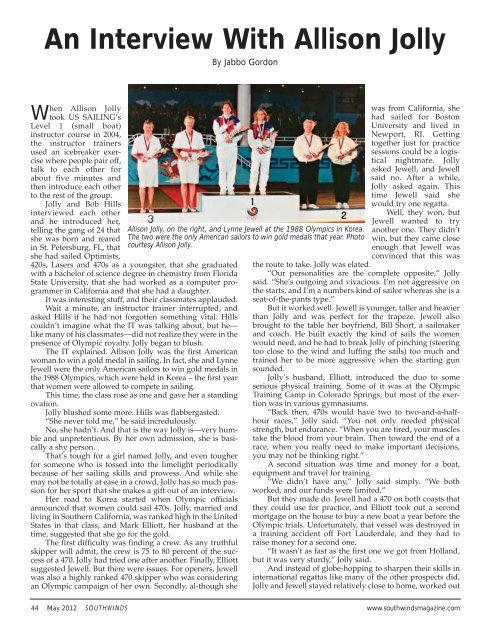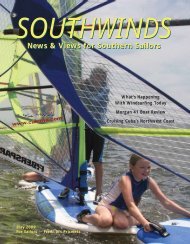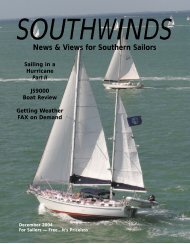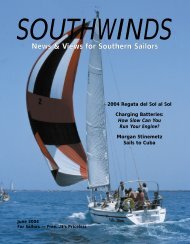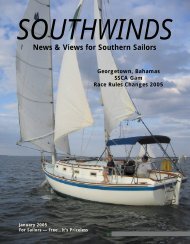An Interview With Allison JollyBy Jabbo GordonWhen Allison Jollytook US SAILING’sLevel 1 (small boat)instructor course in 2004,the instructor trainersused an icebreaker exercisewhere people pair off,talk to each other <strong>for</strong>about five minutes andthen introduce each otherto the rest of the group.Jolly and Bob Hillsinterviewed each otherand he introduced her,telling the gang of 24 thatshe was born and rearedin St. Petersburg, FL, thatshe had sailed Optimists,420s, Lasers and 470s as a youngster, that she graduatedwith a bachelor of science degree in chemistry from FloridaState University, that she had worked as a computer programmerin Cali<strong>for</strong>nia and that she had a daughter.It was interesting stuff, and their classmates applauded.Wait a minute, an instructor trainer interrupted, andasked Hills if he had not <strong>for</strong>gotten something vital. Hillscouldn’t imagine what the IT was talking about, but he—like many of his classmates—did not realize they were in thepresence of Olympic royalty. Jolly began to blush.The IT explained. Allison Jolly was the first Americanwoman to win a gold medal in sailing. In fact, she and LynneJewell were the only American sailors to win gold medals inthe 1988 Olympics, which were held in Korea – the first yearthat women were allowed to compete in sailing.This time, the class rose as one and gave her a standingovation.Jolly blushed some more. Hills was flabbergasted.“She never told me,” he said incredulously.No, she hadn’t. And that is the way Jolly is—very humbleand unpretentious. By her own admission, she is basicallya shy person.That’s tough <strong>for</strong> a girl named Jolly, and even tougher<strong>for</strong> someone who is tossed into the limelight periodicallybecause of her sailing skills and prowess. And while shemay not be totally at ease in a crowd, Jolly has so much passion<strong>for</strong> her sport that she makes a gift out of an interview.Her road to Korea started when Olympic officialsannounced that women could sail 470s. Jolly, married andliving in <strong>Southern</strong> Cali<strong>for</strong>nia, was ranked high in the UnitedStates in that class, and Mark Elliott, her husband at thetime, suggested that she go <strong>for</strong> the gold.The first difficulty was finding a crew. As any truthfulskipper will admit, the crew is 75 to 80 percent of the successof a 470. Jolly had tried one after another. Finally, Elliottsuggested Jewell. But there were issues. For openers, Jewellwas also a highly ranked 470 skipper who was consideringan Olympic campaign of her own. Secondly, al-though shewas from Cali<strong>for</strong>nia, shehad sailed <strong>for</strong> BostonUniversity and lived inNewport, RI. Gettingtogether just <strong>for</strong> practicesessions could be a logisticalnightmare. Jollyasked Jewell, and Jewellsaid no. After a while,Jolly asked again. Thistime Jewell said shewould try one regatta.Well, they won, butJewell wanted to tryanother one. They didn’twin, but they came closeenough that Jewell wasconvinced that this wasthe route to take. Jolly was elated.“Our personalities are the complete opposite,” Jollysaid. “She’s outgoing and vivacious. I’m not aggressive onthe starts, and I’m a numbers kind of sailor whereas she is aseat-of-the-pants type.”But it worked well. Jewell is younger, taller and heavierthan Jolly and was perfect <strong>for</strong> the trapeze. Jewell alsobrought to the table her boyfriend, Bill Short, a sailmakerand coach. He built exactly the kind of sails the womenwould need, and he had to break Jolly of pinching (steeringtoo close to the wind and luffing the sails) too much andtrained her to be more aggressive when the starting gunsounded.Jolly’s husband, Elliott, introduced the duo to someserious physical training. Some of it was at the OlympicTraining Camp in Colorado Springs, but most of the exertionwas in various gymnasiums.“Back then, 470s would have two to two-and-a-halfhourraces,” Jolly said. “You not only needed physicalstrength, but endurance. “When you are tired, your musclestake the blood from your brain. Then toward the end of arace, when you really need to make important decisions,you may not be thinking right.”A second situation was time and money <strong>for</strong> a boat,equipment and travel <strong>for</strong> training.“We didn’t have any,” Jolly said simply. “We bothworked, and our funds were limited.”But they made do. Jewell had a 470 on both coasts thatthey could use <strong>for</strong> practice, and Elliott took out a secondmortgage on the house to buy a new boat a year be<strong>for</strong>e theOlympic trials. Un<strong>for</strong>tunately, that vessel was destroyed ina training accident off Fort Lauderdale, and they had toraise money <strong>for</strong> a second one.“It wasn’t as fast as the first one we got from Holland,but it was very sturdy,” Jolly said.And instead of globe-hopping to sharpen their skills ininternational regattas like many of the other prospects did,Jolly and Jewell stayed relatively close to home, worked outAllison Jolly, on the right, and Lynne Jewell at the 1988 Olympics in Korea.The two were the only American sailors to win gold medals that year. Photocourtesy Allison Jolly.44 May 2012 SOUTHWINDS www.southwindsmagazine.com
in gyms and raced Snipesagainst men.“I didn’t care <strong>for</strong> <strong>for</strong>eigntravel anyway, even if we hadhad the financial support,”Jolly said. “Besides thoseSnipe sailors were great. I hada 5-0-5 and a Snipe, but the 5-0-5 was overpowering andthe Snipe was slower. Ithelped me with my tacticsand how to shape the sails.”Still her 5-0-5 was a benefit,because the sails were largerand made a 470 seem easy.Then came the trials atNewport, RI, in July. TheJolly-Jewell team was notconsidered a serious contender.It was a long shot, atbest, according to the sailingprognosticators.“We were not thefavorites,” Jolly said with asmile. “The entry list lookedlike a who’s who of womensailors. Five or six teamscould have won.”No one seemed to knowJolly and Jewell were lurkinguntil they pounced. Thosehundreds of tacks and jibesand those hundreds of markroundings paid off. Conditionswere rough, but that was theway Jolly and Jewell liked it.Despite a poor start in thequalifiers, the duo came outof nowhere, worked its wayto the top and earned a spoton the American team.“We had only six weeks, but from the beginning Ithought we should medal,” Jolly said. “In my opinion, six toeight of the best women’s teams in the world were from theUnited States.”As it turned out, the trials competition was tougherthan the actual Olympics. Germany and Finland were factors,but despite losing a protest to France in the third race,Jolly and Jewell were so far ahead by the last race, theyneeded only to be in the top 14 to win the gold.They sailed conservatively and nabbed a ninth,although the weather conditions were so poor, Jolly andJewell didn’t know if they had finished 10th or 20th untilthey reached shore. They had grabbed the gold, but therewas no secret to their success.“It was a case where everything came together at all theright times,” Jolly recalled. “We had key people at the rightspot at the right time.”As mentioned, Elliott provided the physical trainingand Shore built the sails, but Larry Tuttle of Melbourne didthe rigging. Her sister, Jocelyn, is a physical therapist whoJolly, at the helm, and Vandemore at the nationals in 2009. Photo byDan Goldman.Allison Jolly, on the left at the helm, and crew Molly O’BrienVandemore sailing in the 2009 470 Nationals in 2009 in Sarasota,FL. Vandemore is now crewing with Anna Tunnicliffe in the 2012Olympics. Photo by Dan Goldman.came to Korea and gaveJolly some ultrasound treatmentsthat took a crick outof her neck.“And there were my parents,Blanchard and BeckyJolly,” she added. “Withoutany one of those people, Idon’t think the outcomewould have been the same.”However, that was it. In1992, both had small children,and there<strong>for</strong>e, evenless time and money tomount an Olympic campaign.When the gamescame to Atlanta in 1996 andSavannah was the sailingvenue, Jolly and Jewellmade a try.“We had been ranked No.2 in the nation in 1995, andwe thought we had a shot,”Jolly said. “But they hadshortened the courses considerably,putting more emphasison the starts and less onupwind sailing. We didn’t dowell. I am the worst starter onthe face of the earth,” shecommented. “And I don’tlike all the yelling.”Her coaching duties atthe University of SouthFlorida have curtailed mostof her Olympic thoughts inrecent years, but Jolly didentertain an idea of throwingher sailing hat into thisyear’s ring if <strong>for</strong> no otherreason than to push a teamand raise the bar a little bit.“A couple of years ago, I asked Sarah Lihan of FortLauderdale if she would crew, but she wanted to stick withthe Laser Radial class,” Jolly said. “Ironically, she has goneto the 470 and is crewing <strong>for</strong> Amanda Clark.”That may be the team to watch.In conclusion, Jolly likes to tell an Olympic story whichshe has told on the banquet circuit when someone is <strong>for</strong>tunateenough to lure her into a speaking engagement. It isabout the Korean wind <strong>for</strong>ecasts.Jolly and Jewell were one of the two teams representingthe United States at a pre-Olympics regatta in Korea theyear of the actual event. Each country could send twoteams. “When we got there, the wind was really cranking,”she said. “And we asked ‘what the heck?’ because all of thepreviously published in<strong>for</strong>mation showed light air.Well, it seems that their wind measuring device keptgetting blown over, so they moved it around to the back ofthe weather building, out of the wind. That’s why the readingswere so low.”<strong>News</strong> & <strong>Views</strong> <strong>for</strong> <strong>Southern</strong> <strong>Sailors</strong> SOUTHWINDS May 2012 45
- Page 3: TURNER MARINE YACHT SALESMobile, AL
- Page 6 and 7: SOUTHWINDSNEWS & VIEWS FOR SOUTHERN
- Page 8 and 9: SOUTHWINDSNews & Views For Southern
- Page 10 and 11: FROM THE HELMSTEVE MORRELL, EDITORP
- Page 12 and 13: LETTERSlocal officials could be rem
- Page 14 and 15: Bubba Clears Up Youth Sailing Conun
- Page 16 and 17: EVENTS & NEWS OF INTEREST TO SOUTHE
- Page 18: May 14-18. Offshore Sailing School,
- Page 21 and 22: the extensive docks at The Club. Bo
- Page 23 and 24: Ethanol and Old OutboardBoat Engine
- Page 25 and 26: To Advertise, call 941-795-8704 or
- Page 27 and 28: To Advertise, call 941-795-8704 or
- Page 29 and 30: To Advertise, call 941-795-8704 or
- Page 31 and 32: shall unreasonably or unnecessarily
- Page 33 and 34: SMALL BOAT REVIEWThe HamptonBy Jabb
- Page 35 and 36: Hampton sailors range in age from t
- Page 37 and 38: ST. PETERSBURG MUNICIPAL MARINAFLOR
- Page 39 and 40: BOATOWNER’S BOAT REVIEWSeaPearl 2
- Page 41 and 42: The SeaPearl Tri-Sport can be order
- Page 43 and 44: Frenchmen Jacques Fornier and J.C.
- Page 45: Bill and Sherry Welch of Useppa and
- Page 49 and 50: Mills’ yard in the 1950s, Clearwa
- Page 51 and 52: RACING■ SOUTHERN REGIONAL RACINGT
- Page 53 and 54: 59th Annual Mug Race, The RudderClu
- Page 55 and 56: Sailing in the Sarasota Sailing Squ
- Page 57 and 58: holds its opening day ceremonies an
- Page 59 and 60: Performance CruisingSabre 456, 426,
- Page 61 and 62: “Making Dreams Come True”Servin
- Page 63 and 64: CLASSIFIED ADSAds Starting at 3 Mon
- Page 65 and 66: CLASSIFIED ADS34’ Gemini 105C 200
- Page 67 and 68: CLASSIFIED ADS2002 Beneteau First 4
- Page 69 and 70: March 2012CLASSIFIED ADSHELP WANTED
- Page 71 and 72: ADVERTISER’S CATEGORIESTELL THEM


